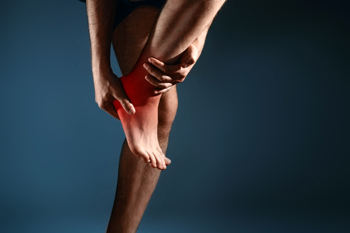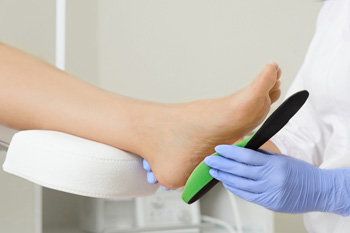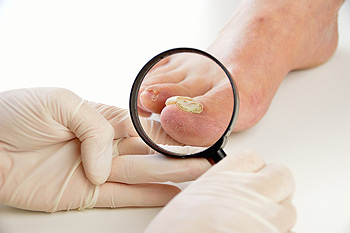Items filtered by date: December 2020
Ways to Keep Your Child’s Feet Healthy
 Since the feet are used constantly throughout one’s lifetime, taking care of your child’s feet is essential in maintaining their overall health. First, it is important to allow the feet to have free movement in their infant stages. Unless your child is cold or going outside, the feet should not be restricted by tight foot coverings such as socks, shoes, bootees, or leggings. It is also important to make sure that your baby’s socks and shoes fit properly since their feet are always growing, and coverings that are too tight may impact circulation. Lastly, make sure to wash your child’s feet daily with soap and water. Once your child is ready to start walking, let them learn at their own pace. If your child’s toes turn out frequently, or one foot turns in, or they aren’t walking by 18 months, it is recommended that you seek the care of a podiatrist for further help.
Since the feet are used constantly throughout one’s lifetime, taking care of your child’s feet is essential in maintaining their overall health. First, it is important to allow the feet to have free movement in their infant stages. Unless your child is cold or going outside, the feet should not be restricted by tight foot coverings such as socks, shoes, bootees, or leggings. It is also important to make sure that your baby’s socks and shoes fit properly since their feet are always growing, and coverings that are too tight may impact circulation. Lastly, make sure to wash your child’s feet daily with soap and water. Once your child is ready to start walking, let them learn at their own pace. If your child’s toes turn out frequently, or one foot turns in, or they aren’t walking by 18 months, it is recommended that you seek the care of a podiatrist for further help.
The health of a child’s feet is vital to their overall well-being. If you have any questions regarding foot health, contact Donald Manger, DPM of Associated Podiatric Physicians, PA. Our doctor can provide the care you need to keep you pain-free and on your feet.
Tips for Keeping Children's Feet Healthy
- Make sure their shoes fit properly
- Look for any signs of in-toeing or out-toeing
- Check to see if they have Clubfoot (condition that affects your child’s foot and ankle, twisting the heel and toes inward) which is one of the most common nonmajor birth defects.
- Lightly cover your baby’s feet (Tight covers may keep your baby from moving their feet freely, and could prevent normal development)
- Allow your toddler to go shoeless (Shoes can be restricting for a young child’s foot)
- Cut toenails straight across to avoid ingrown toenails
- Keep your child’s foot clean and dry
- Cover cuts and scrapes. Wash any scratches with soap and water and cover them with a bandage until they’ve healed.
If you have any questions, please feel free to contact our office located in Hamilton Township, NJ . We offer the newest diagnostic and treatment technologies for all your foot care needs.
Gout Pain Can Be Managed
Runners and Foot Pain
 People who enjoy running and jogging need to be especially aware of the different types of foot pain that can be endured. Plantar fasciitis is a common foot condition that can gradually develop from running over long periods of time. It generally produces heel and arch pain, and in severe cases, it may become difficult to walk. Stress fractures often occur in the metatarsals, and are considered to be hairline cracks in the bones. This can happen from increasing speed and distance too fast, and running must be stopped as the healing process occurs. Extensor tendonitis is a painful condition that may be caused by wearing shoes that do not fit correctly, or it may come from having a weak or tight Achilles tendon. If you have any type of foot pain, it is strongly suggested that you schedule an appointment with a podiatrist who can provide a proper diagnosis and guide you towards various treatment techniques.
People who enjoy running and jogging need to be especially aware of the different types of foot pain that can be endured. Plantar fasciitis is a common foot condition that can gradually develop from running over long periods of time. It generally produces heel and arch pain, and in severe cases, it may become difficult to walk. Stress fractures often occur in the metatarsals, and are considered to be hairline cracks in the bones. This can happen from increasing speed and distance too fast, and running must be stopped as the healing process occurs. Extensor tendonitis is a painful condition that may be caused by wearing shoes that do not fit correctly, or it may come from having a weak or tight Achilles tendon. If you have any type of foot pain, it is strongly suggested that you schedule an appointment with a podiatrist who can provide a proper diagnosis and guide you towards various treatment techniques.
Foot Pain
Foot pain can be extremely painful and debilitating. If you have a foot pain, consult with Donald Manger, DPM from Associated Podiatric Physicians, PA. Our doctor will assess your condition and provide you with quality foot and ankle treatment.
Causes
Foot pain is a very broad condition that could be caused by one or more ailments. The most common include:
- Bunions
- Hammertoes
- Plantar Fasciitis
- Bone Spurs
- Corns
- Tarsal Tunnel Syndrome
- Ingrown Toenails
- Arthritis (such as Gout, Rheumatoid, and Osteoarthritis)
- Flat Feet
- Injury (from stress fractures, broken toe, foot, ankle, Achilles tendon ruptures, and sprains)
- And more
Diagnosis
To figure out the cause of foot pain, podiatrists utilize several different methods. This can range from simple visual inspections and sensation tests to X-rays and MRI scans. Prior medical history, family medical history, and any recent physical traumatic events will all be taken into consideration for a proper diagnosis.
Treatment
Treatment depends upon the cause of the foot pain. Whether it is resting, staying off the foot, or having surgery; podiatrists have a number of treatment options available for foot pain.
If you have any questions, please feel free to contact our office located in Hamilton Township, NJ . We offer the newest diagnostic and treatment technologies for all your foot care needs.
Understanding Orthotics
 Orthotics are shoe inserts that are designed to relieve pain that is caused by a foot condition. Orthotics can help to treat a variety of ailments, such as corns and calluses, tendonitis, bunions, heel pain, and recurring stress fractures. Orthotics may also be used to help correct posture and alignment issues as needed. Types of orthotics can include prefabricated or custom orthotics, cushioned orthotics to provide shock absorption, and pressure relief orthotics that redistribute body weight across the sole of the foot. When prescribing orthotics, a podiatrist will consider a variety of factors, including existing foot conditions, foot structure, biomechanics, the type of shoes normally worn, and lifestyle factors. If you believe that orthotics may be helpful for your foot-related issues, don’t hesitate to visit a podiatrist for more information.
Orthotics are shoe inserts that are designed to relieve pain that is caused by a foot condition. Orthotics can help to treat a variety of ailments, such as corns and calluses, tendonitis, bunions, heel pain, and recurring stress fractures. Orthotics may also be used to help correct posture and alignment issues as needed. Types of orthotics can include prefabricated or custom orthotics, cushioned orthotics to provide shock absorption, and pressure relief orthotics that redistribute body weight across the sole of the foot. When prescribing orthotics, a podiatrist will consider a variety of factors, including existing foot conditions, foot structure, biomechanics, the type of shoes normally worn, and lifestyle factors. If you believe that orthotics may be helpful for your foot-related issues, don’t hesitate to visit a podiatrist for more information.
If you are having discomfort in your feet and would like to try orthotics, contact Donald Manger, DPM from Associated Podiatric Physicians, PA. Our doctor can provide the care you need to keep you pain-free and on your feet.
What Are Orthotics?
Orthotics are inserts you can place into your shoes to help with a variety of foot problems such as flat feet or foot pain. Orthotics provide relief and comfort for minor foot and heel pain but can’t correct serious biomechanical problems in your feet.
Over-the-Counter Inserts
Orthotics come in a wide variety of over-the-counter inserts that are used to treat foot pain, heel pain, and minor problems. For example, arch supports can be inserted into your shoes to help correct overarched or flat feet, while gel insoles are often used because they provide comfort and relief from foot and heel pain by alleviating pressure.
Prescription Orthotics
If over-the-counter inserts don’t work for you or if you have a more severe foot concern, it is possible to have your podiatrist prescribe custom orthotics. These high-quality inserts are designed to treat problems such as abnormal motion, plantar fasciitis, and severe forms of heel pain. They can even be used to help patients suffering from diabetes by treating foot ulcers and painful calluses and are usually molded to your feet individually, which allows them to provide full support and comfort.
If you are experiencing minor to severe foot or heel pain, it’s recommended to speak with your podiatrist about the possibilities of using orthotics. A podiatrist can determine which type of orthotic is right for you and allow you to take the first steps towards being pain-free.
If you have any questions please contact our office located in Hamilton Township, NJ . We offer the newest diagnostic and treatment technologies for all your foot and ankle needs.
Signs of a Fungal Nail Infection
Fungal nail infect ions can occur in both the toenails and fingernails. These fungi tend to live in warm and moist environments, and they like to feed on the keratin that makes up the toenails. Fungal nail infections can be commonly spread in environments such as locker rooms and public pool areas, but they can also spread from poor foot hygiene. Nails that have been affected typically appear as yellow or brown, and they can become thicker. If the infection worsens, the affected nail could begin to crumble and accumulate debris that smells foul. Toenail fungal infections are difficult to completely heal on their own, so it is important to seek medical attention if you see any signs or symptoms. A podiatrist will provide a proper diagnosis and determine a treatment plan that is best for you.
ions can occur in both the toenails and fingernails. These fungi tend to live in warm and moist environments, and they like to feed on the keratin that makes up the toenails. Fungal nail infections can be commonly spread in environments such as locker rooms and public pool areas, but they can also spread from poor foot hygiene. Nails that have been affected typically appear as yellow or brown, and they can become thicker. If the infection worsens, the affected nail could begin to crumble and accumulate debris that smells foul. Toenail fungal infections are difficult to completely heal on their own, so it is important to seek medical attention if you see any signs or symptoms. A podiatrist will provide a proper diagnosis and determine a treatment plan that is best for you.
For more information about treatment, contact Donald Manger, DPM of Associated Podiatric Physicians, PA. Our doctor can provide the care you need to keep you pain-free and on your feet.
Toenail Fungus Treatment
Toenail fungus is a condition that affects many people and can be especially hard to get rid of. Fortunately, there are several methods to go about treating and avoiding it.
Antifungals & Deterrence
Oral antifungal medicine has been shown to be effective in many cases. It is important to consult with a podiatrist to determine the proper regiment for you, or potentially explore other options.
Applying foot powder on the feet and shoes helps keep the feet free of moisture and sweat.
Sandals or open toed shoes – Wearing these will allow air movement and help keep feet dry. They also expose your feet to light, which fungus cannot tolerate. Socks with moisture wicking material also help as well.
If you have any questions please feel free to contact our office located in Hamilton Township, NJ . We offer the newest diagnostic tools and technology to treat your foot and ankle needs.

